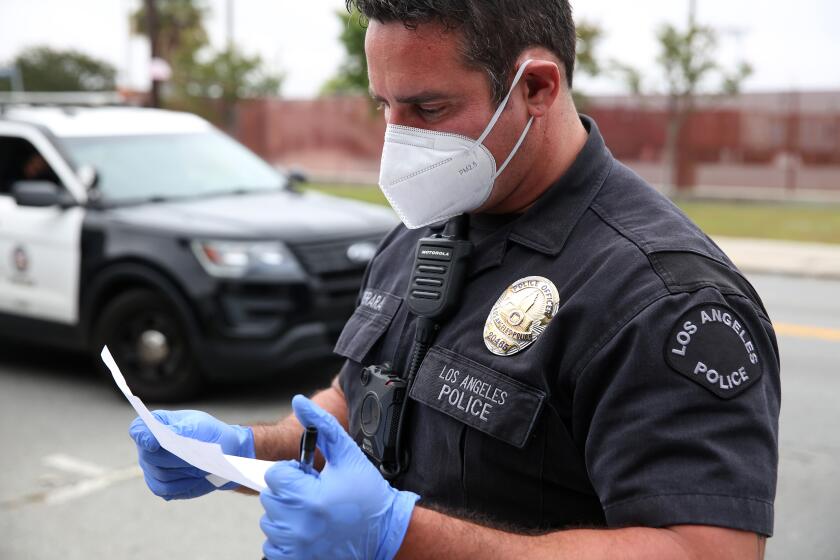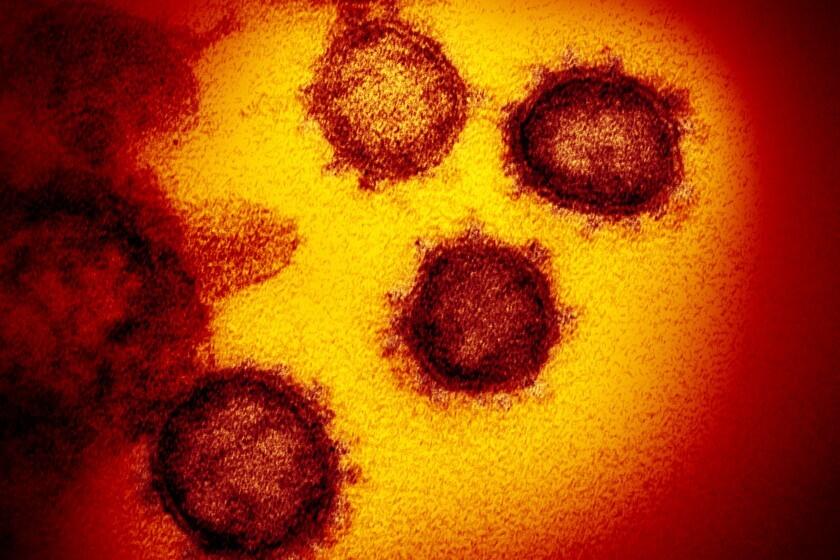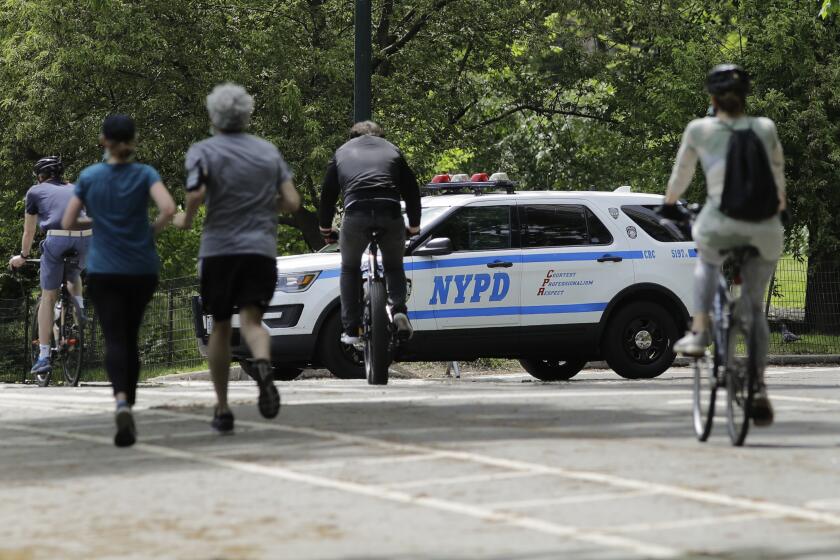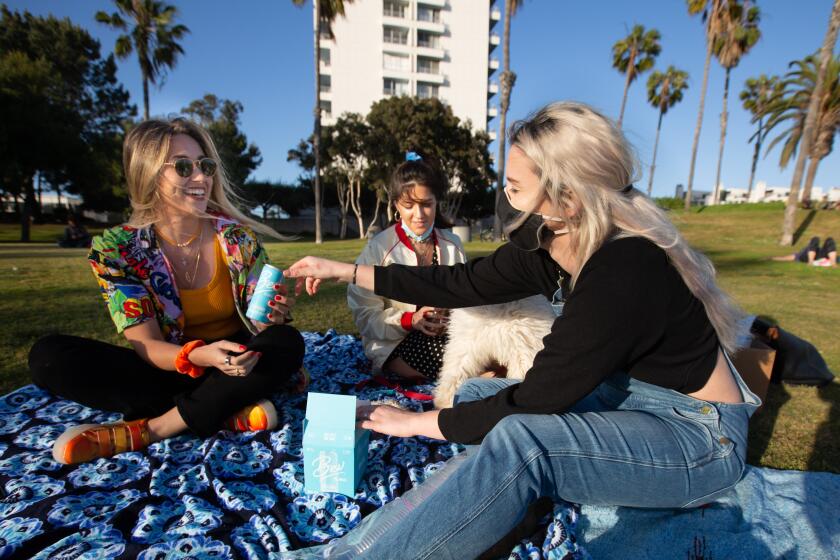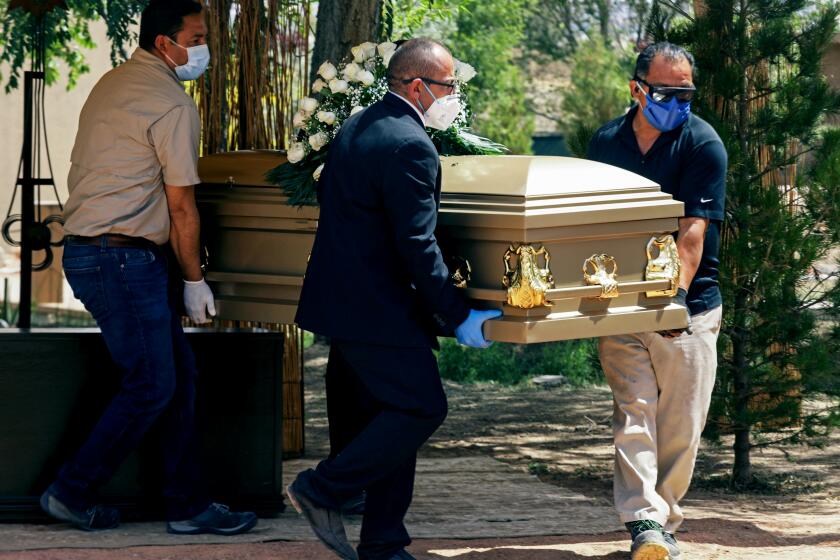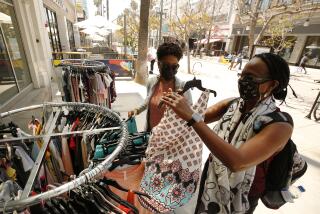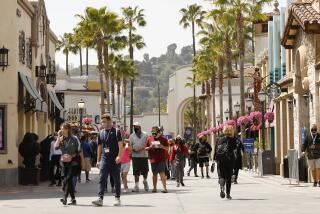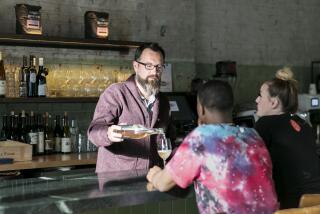California continues to ease into reopening amid coronavirus fight
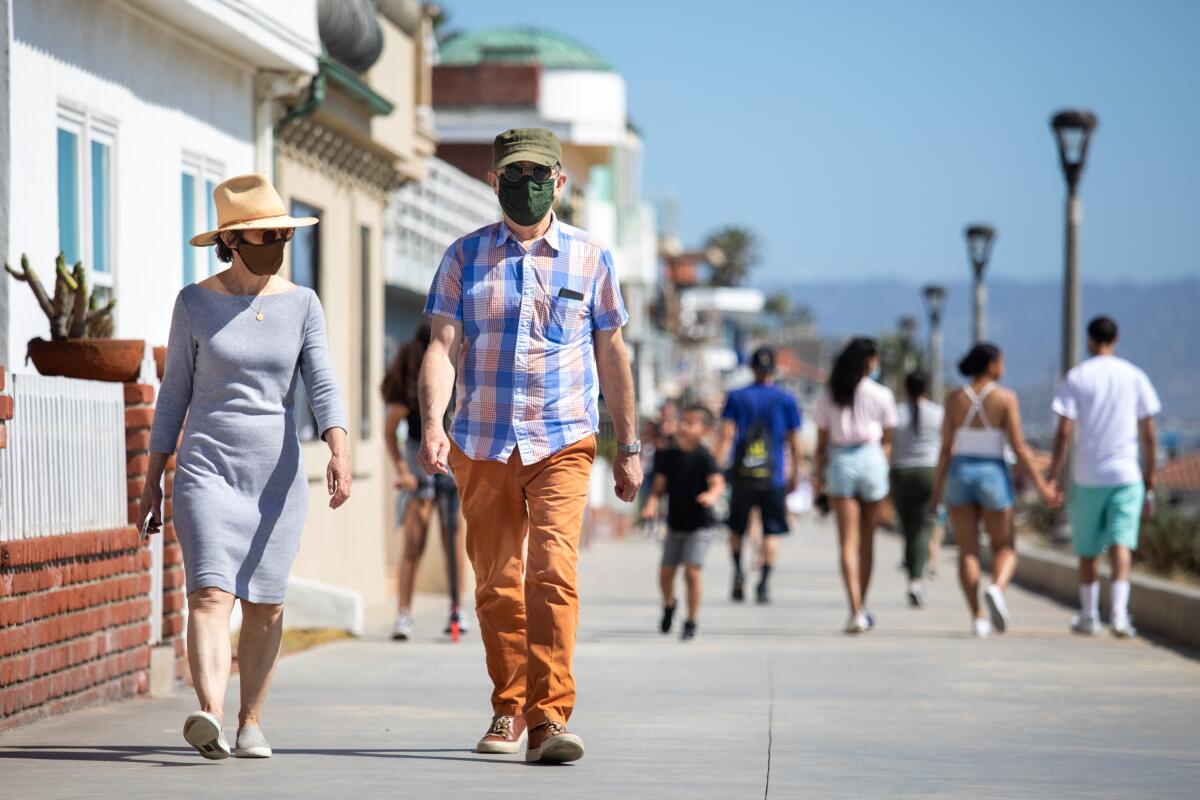
- Share via
More hiking trails and recreation areas reopened Saturday as California continued to ease into the recovery phase of its fight against the novel coronavirus.
The Angeles National Forest on Saturday reopened 23 popular trails, four trailheads and 19 roads in the San Gabriel Mountains. Forest officials also will begin gradually reopening campgrounds, picnic areas and other “developed recreation” sites that have been off-limits since early April.
That was preceded by the reopening of Los Angeles city and county trails May 9, followed by L.A. County beaches Wednesday.
The city of L.A.’s Slow Streets initiative, which limits street traffic to neighborhood residents so people can walk, run and bike, launched Friday in Del Rey and Sawtelle.
“Learning to live with COVID-19 means finding creative ways to get outside while staying close to home,” Mayor Eric Garcetti said in a statement.
The locations were chosen for plans they created to adhere to public health guidelines, officials said in a news release. People using the streets are required to engage in active recreation, wear a face covering and keep six feet away from others at all times.
California is moving through Phase 2 of relaxing its stay-at-home orders. Along with many outdoor areas, businesses deemed at lower risk have been gradually permitted to reopen, with retailers offering curbside pickup only.
Many retailers are still adjusting to the new rules, which also require that they put in place physical-distancing guidelines and infection-control protocols.
At the Original Farmers Market in Los Angeles, Kip’s Toyland reopened Friday with only one worker per shift.
The store was not allowing anyone inside Saturday, but that didn’t stop customers from trying.
“We have had a surprising amount of people that have actually come up to the door even though we’ve been trying to do mainly phone orders,” employee Eli Margolis said, “so I’ve been doing this kind of crazy thing of having to run around the whole store and show them something they might like.”
“It was kind of difficult. But that’s on me to kind of figure out and make suggestions.”
A coronavirus test with results within 15 minutes could prevent the virus’ spread and the LAPD is pushing city officials to get the equipment.
Margolis said there had been four customers at the retro toy shop by early Saturday afternoon. He sold some puzzles, a hobbyhorse and the board game Sorry!
“For the most part I think it’s still kind of this weird stagnant period right now, especially with everyone still trying to refigure out — especially stores like us trying to redo our whole game plan and figure out how to kind of function in this new world,” he said. “It’s strange for sure.”
Flowers by Eugene in La Puente was permitting customers to come inside Saturday but requiring them to wear masks. A manager there also described the attempt at moving toward normalcy as surreal.
“It’s still kind of weird,” said the manager, Liz, who declined to give her last name. “I feel like it’s slowly getting better because we do have people coming in and calling.”
The store has been physically open since last week but had been taking online and phone orders before that.
While customers were slowly returning, the florist was facing a different hurdle.
Almost 200 at Mother’s Day church service were exposed to the coronavirus by an attendee with COVID-19, officials say.
“The problem is we’re limited in our flower supply because of what’s going on,” Liz said. “Flowers, it’s pretty scarce out there right now. The few people that have flowers out there now are asking for a lot.”
Now Serving is a small independent bookstore in Chinatown that specializes in cookbooks and culinary books. Ken Concepcion, who owns it with his wife, Michelle Mungcal, said customers haven’t been inside the shop since March, and he has pivoted to online sales and worked to showcase his inventory on his website.
“I still think we don’t know enough about the virus to where we can make definitive choices,” Concepcion said. He said they have a toddler and an employee who lives with an elderly relative.
“It seems irresponsible if we were just to let anybody come in,” he said.
Customers place orders online, then swing by to pick them up, with the store now serving as a kind of warehouse.
“We’ll place their goods on a table outside our door,” Concepcion said. “There’s a lot of waving, but there’s not a lot of other interaction.”
Gov. Andrew Cuomo urged lawmakers to put politics aside and focus on helping New York and other states receive funding from the federal government.
Still, some businesses said it was difficult to serve customers remotely.
“It doesn’t feel normal,” said Donna Tabut, assistant manager of Book Alley in Pasadena. “We’re primarily a used bookstore. A lot of customers, they like to look at the book.”
Browsing is a key part of the store’s business model, she said.
“Someone will come in, they can’t find the book that they were looking for, and they’ll come up to the register with 10 books that they weren’t expecting to find.”
Still, the store was taking orders through its website, as well as by phone and email. Customers were also able to walk up and look at the display window.
“As long as you’re six feet away from the store wearing a facial covering, we’ll try to assist you in whatever way we can,” Tabut said. “But we can’t allow anyone into the store at this moment.”
Coronavirus: Some Angelenos loosen up their personal boundaries as they try to balance safety and mental health
At Just Ride L.A., a bicycle shop in downtown Los Angeles, business has been open throughout the pandemic, and it has been booming.
“We can’t even do rentals anymore because we don’t have any more bikes to rent,” sales manager Darina Parker said. “They’re flying off the shelves. We can barely hang onto any bikes.”
Because the shop does bicycle repairs, Parker said, it was deemed an essential business and was allowed to stay open. Before the pandemic, Parker said, the shop sold three or four bicycles a day, but now it sells 10 to 20.
At Golden Apple Comics on Melrose Avenue, the doors are still closed to customers, but people are picking up orders in the back parking lot. Owner Ryan Liebowitz said his shop hasn’t received a shipment of new comics since March, thanks to shutdowns in printing, distribution and shipping, but he expects new comics to start arriving next week.
“Comic book stores live and die every week by their shipment,” Liebowitz said.
Until curbside pickup was recently allowed, Liebowitz said, Golden Apple was relying on customers who subscribe to titles through the store and on online sales, with expanded online events intended to connect with customers.
In cities across Mexico, morgues are full and funeral homes are jammed but nobody knows for sure how many people have died in the COVID-19 pandemic.
“Our online sales are through the roof,” he said. “We’re waiting on Phase Three, where we can let people inside the shop. That hasn’t happened yet.”
Counties that meet certain criteria can apply for a variance to move more quickly through Phase 2, allowing for the opening of additional businesses, like dine-in restaurants and shopping malls.
Riverside County notified Gov. Gavin Newsom on Thursday that it was requesting such an acceleration, saying it had met six of the seven criteria to reopen more quickly.
The county has a plan to protect essential workers and expand contact tracing capabilities; it also has ample testing capacity, the ability to protect vulnerable residents and enough surge capacity in its health system, the county Board of Supervisors wrote in a letter to Newsom.
When it comes to the seventh requirement — that a county must demonstrate that it has contained COVID-19 by having no deaths in the previous 14 days, and no more than one case per 10,000 residents over the same time frame — county officials said it was not attainable.
“In our opinion, the metrics are unrealistic for urban counties, and Riverside County in particular, where our geographic size and population make it impossible that no deaths from COVID-19 will result in a 14-day time frame,” they wrote.
Instead, they wrote, it would be more appropriate to adopt federal benchmarks, which the county is already meeting due to downward trends in cases, positive test results and flu- and COVID-19-like symptomatic cases.
Butte County is one of 22 counties that has certified to the state that it meets the conditions for additional businesses to reopen.
But after a person who attended an in-person religious service on Mother’s Day tested positive for the coronavirus, public health officials issued a strongly worded warning to residents not to speed too quickly through the process.
The person received positive test results the day after the service, which had more than 180 attendees, officials said Friday in a news release.
Gatherings of any size remain prohibited, even in counties that are reopening more quickly than the rest of the state. But the organization that held the service chose to open its doors despite the rules, exposing the entire congregation to the coronavirus, officials said.
“This decision comes at a cost of many hours and a financial burden to respond effectively to slow or stop the spread of COVID-19,” the release said, noting that health officials are working to notify all those who attended the service and instruct them to self-quarantine. The county health department also is working with healthcare partners to obtain testing for all attendees, officials said.
“At this time, organizations that hold in-person services or gatherings are putting the health and safety of their congregations, the general public and our local ability to open up at great risk,” Danette York, Butte County’s public health director, said in a statement urging residents to follow stay-at-home orders.
“Moving too quickly through the reopening process can cause a major setback and could require us to revert back to more restrictive measures,” York said.
Butte County’s public health officer, Andy Miller, announced Saturday that he is resigning, effective July 10. The decision was not related to any particular incident or disagreement, the county public health department said in a news release.
Miller’s contract was up for renewal in the fall, and he wanted to give the health department more time to recruit a replacement, the release said.
“We are prepared to recruit for a health officer who, like Dr. Miller, will lead us as we bring our economy back and keep this virus at bay,” Shari McCracken, the county’s chief administrative officer, said in a statement.
In Los Angeles County, which is home to nearly half the state’s confirmed coronavirus cases and more than half the related deaths, officials have said it’s extremely unlikely they would attempt to apply for a variance to reopen more quickly than the rest of the state.
But like the state, the county has seen varying impacts from the virus, with some areas hit less hard than others.
For that reason, L.A. County officials are trying to determine whether it’s possible for individual cities that meet the benchmarks to move to the next stage of reopening before other parts of the county do.
Supervisor Kathryn Barger said Friday that the cities of Santa Clarita, Lancaster and Palmdale have approached the county to inquire about reopening and appear to meet Newsom’s criteria.
She said she has asked county counsel and the Department of Public Health to provide an analysis of whether there’s anything in the governor’s order that would permit the cities to do so.
“I think it’s important for cities to be able to meet their own benchmarks and safely reopen so they are not dependent only on the county,” Barger said.
More to Read
Sign up for Essential California
The most important California stories and recommendations in your inbox every morning.
You may occasionally receive promotional content from the Los Angeles Times.
